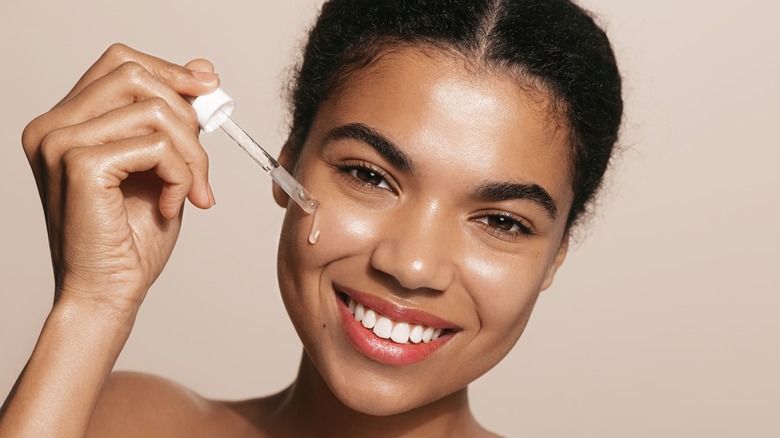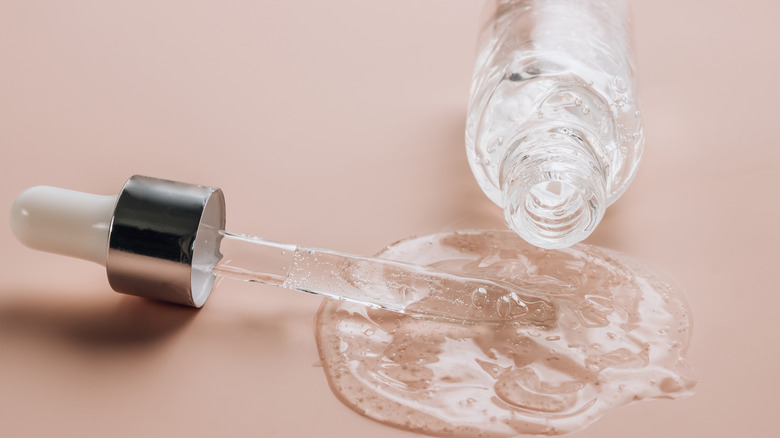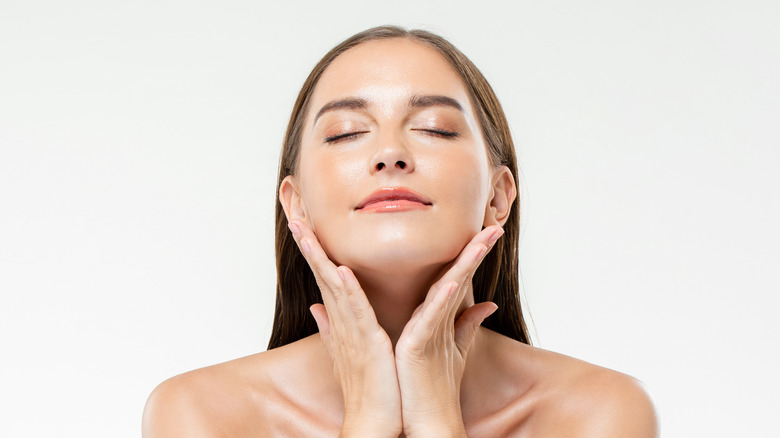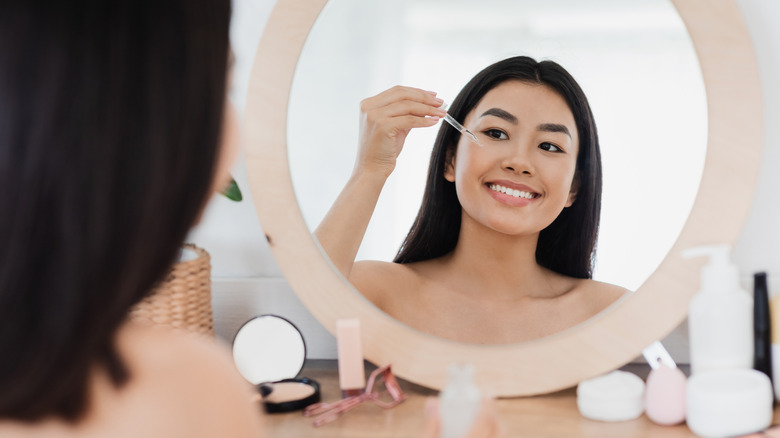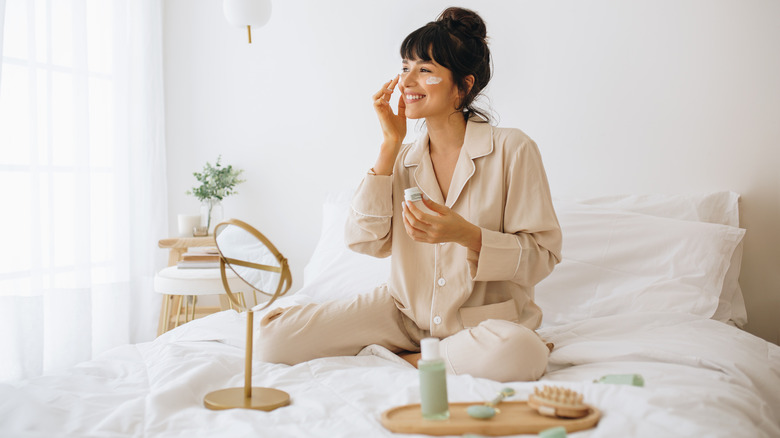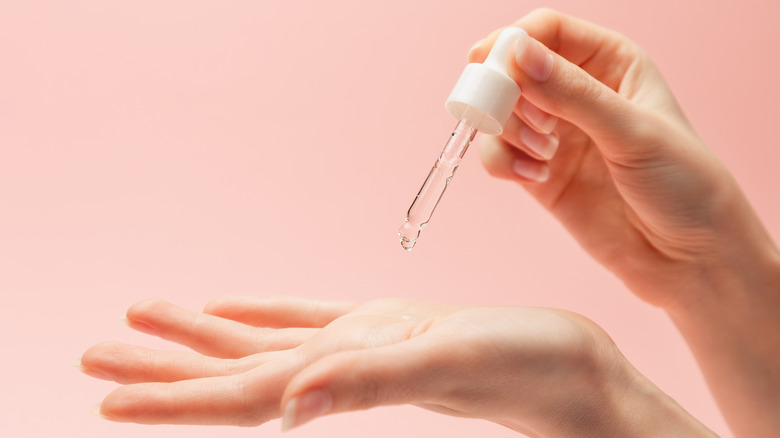How To Use Niacinamide For Amazing Skin
Dark spots and acne can feel like the end of the world. You have tried every cream, gel, and wash known to man, yet nothing seems to work. Skincare is the largest sector in the cosmetic industry, according to Statista. When building your skincare regime, it can be overwhelming with the slew of toners, exfoliators, and serums. Each product has a different star ingredient and claims to fix certain conditions. However, flawless skin might be easier to attain than you think.
Dermatologist Steven Nwe, reminds us, "Investing early in the health of your skin, with regular skin care, will not only better protect it from the harsh effects of winter, but also keep you looking and feeling your best throughout the year" (via Northwestern Medicine). Instead of focusing on the product or brand, prioritizing the ingredients is a great way to find out what targets your needs and will work for you. And if you're looking for something new to try on your skin, how about niacinamide?
What is niacinamide?
Before your pores absorb this skincare ingredient, it'll be comforting to know what it is exactly. Niacinamide is a form of the B3 vitamin, WebMD explains. You might see it referred to as nicotinamide. It is a vitamin found in natural meats, dairy, and produce. Our bodies need niacinamide for healthy cell production. It is not to be confused with niacin or nicotinamide riboside. Although they are also vitamin B3 family members, those compounds aren't the beloved skincare powerhouse.
Medically, niacinamide is often used to tackle vitamin B3 deficiency, per Medline Plus. It is produced as an oral supplement that, at varying degrees, is effective at slowing pellagra, type 1 diabetes, hyperphosphatemia, and osteoarthritis. In the cosmetic industry, niacinamide is a topical product. If you're not already using it, this vitamin might be the ingredient your skincare routine is missing. Applying niacinamide to your skin can favor your epidermis in multiple ways.
How can niacinamide benefit the skin?
Niacinamide is a skincare powerhouse. Primarily it keeps your skin hydrated and builds protein, according to Healthline. Those two attributes result in several skin benefits. The keratin proteins that it builds help to keep skin firm and healthy. While niacinamide is building protein, it also grows a ceramide barrier to lock in moisture. This hydration fights against the conditions that cause acne. Redness and the appearance of large pores will be a thing of the past, as niacinamide reduces inflammation.
All skin types can cash in on niacinamide's advantages. A study published in The Journal of Clinical and Aesthetic Dermatology reported niacinamide significantly penetrated pores when used topically. Individuals who used 5% niacinamide saw a reduction in fine lines, wrinkles, and hyperpigmentation. There aren't any skin-flushing side effects, either. That means no extra blood flow to tint your skin red when using this anti-aging ingredient. So how can you use this cosmeceutical?
The best way to use niacinamide
To see niacinamide make a change in your skin, constancy is key. Board-certified dermatologists Lucy Chen and Rachel Nazarian suggest using niacinamide with a 5% concentration, via Everyday Health. When looking for products with niacinamide, toners, serums, moisturizers, and sunscreens are the way to go. Vitamin B3 needs to penetrate the pores to start working. Think of products that stay on the skin, not cleansers. Dr. Chen recommends using niacinamide with alpha hydroxy acids. She explains, "AHAs exfoliate dead skin cells that make it easier for niacinamide to effectively penetrate."
To get the most out of the topical application of niacinamide, you can use it in more ways than one. It is safe to apply day and night. After cleansing, you can use this all-around ingredient. Medicine Net suggests using a niacinamide toner followed by a niacinamide serum or moisturizer. With vitamin B3 in two steps of your skincare routine, there's no way it can evade your pores. More so, niacinamide can pair well with other products already in your skincare routine.
How to add niacinamide to your skincare routine
Chances are you already have your preferred cleanser and sunscreen, but you can integrate niacinamide seamlessly into your beauty regime. This vitamin works well with other cosmetic products. Board-certified dermatologist Marisa K. Garshick clarifies, "By helping to prevent further moisture loss, it helps to reduce dryness of the skin and can help to boost tolerability of other skincare ingredients" (via Sunday Edit). Garshick recommends using niacinamide with glycolic or kojic acid to help with hyperpigmentation.
Niacinamide pairs well with retinol. The side effects of retinol can be tamed by niacinamide, per Medical News Today. Combining the vitamin with retinol eases skin irritation and dryness. Niacinamide typically comes in serum form for topical application. Apply it before other serums and layer it before your night cream or sunscreen if used in the daytime. Before wiping the shelves of vitamin B3 serums, there are precautions with using niacinamide to avoid a skincare nightmare.
Precautions before using niacinamide
You should be cautious with any products applied to your face. The last thing we want is to break out or cause permanent damage. Topical niacinamide is safe to use, and Healthline suggests there are no side effects. Despite niacinamide being great for all skin types, you never know how it can react with your skin in particular. If you have pre-existing allergies, there is a possibility niacinamide can trigger an allergic reaction because it releases histamine.
If you are using niacinamide for the first time, start slow before building up usage. With introducing any new ingredient to your skincare regime, a patch test is critical to avoid future redness, irritation, and swelling. Board-certified dermatologist Carly Roman explains, "To be thorough, the product would be tested for at least four days to determine if a delayed reaction (delayed hypersensitivity reaction) develops" (via GQ Magazine). If niacinamide agrees with your epidermis, you can have smooth, bright, and even skin for ages. But be sure to consult your dermatologist first before trying it out!
